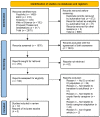Family Caregiver Adaptation during the Transition to Adulthood of Individuals with Intellectual Disabilities: A Scoping Review
- PMID: 38201021
- PMCID: PMC10779180
- DOI: 10.3390/healthcare12010116
Family Caregiver Adaptation during the Transition to Adulthood of Individuals with Intellectual Disabilities: A Scoping Review
Abstract
During the transition to adulthood, individuals diagnosed with intellectual disability (ID) and their family caregivers have unique experiences. This scoping review studies the sources of the family caregiver's objective burden, support, coping mechanisms, positive caregiving, and quality of life to understand the caregiver's adaptation process when the individual with ID transits to adulthood, according to Joanna Briggs Institute (JBI) Scoping Review methodology guidelines. The inclusion criteria included studies of family caregivers of any age who provide unpaid care and live with individuals diagnosed with ID who are transitioning to adulthood. Of 2875 articles identified, 12 published studies were included. The main themes included caregivers reporting dissatisfaction with the available adult services and exhaustion from being a caregiver. Overall, a vicious cycle of likely increased demands during the transition, with caregivers not being prepared to cope with these demands while concurrently being dissatisfied with the adult services system, leads the caregivers to develop a pervasive sense of helplessness. Future studies would benefit from recruiting caregivers from sources other than adult-only service centres and using qualitative (to identify the broad aspects of the key factors) and quantitative (to identify the significant differences between the key factors) methodologies.
Keywords: family adaptation; family caregiver; intellectual disability; neurodevelopmental disorder; positive aspects of caregiving; quality of life; transition to adulthood.
Conflict of interest statement
The authors do not have any conflict of interest to disclose.
Figures
Similar articles
-
Caregiver- and patient-directed interventions for dementia: an evidence-based analysis.Ont Health Technol Assess Ser. 2008;8(4):1-98. Epub 2008 Oct 1. Ont Health Technol Assess Ser. 2008. PMID: 23074509 Free PMC article.
-
Predictors of subjective and objective caregiving burden in older female caregivers of adults with intellectual disabilities.Int Psychogeriatr. 2011 May;23(4):562-72. doi: 10.1017/S1041610210001225. Epub 2010 Aug 12. Int Psychogeriatr. 2011. PMID: 20701815
-
The health and well-being of caregivers of children with cerebral palsy.Pediatrics. 2005 Jun;115(6):e626-36. doi: 10.1542/peds.2004-1689. Pediatrics. 2005. PMID: 15930188
-
[Caregiver burden in relatives of persons with schizophrenia: an overview of measure instruments].Encephale. 2003 Mar-Apr;29(2):137-47. Encephale. 2003. PMID: 14567165 Review. French.
-
Informal caregivers' experiences of transitioning during end-of-life care-A scoping review.J Adv Nurs. 2024 May;80(5):1719-1731. doi: 10.1111/jan.15942. Epub 2023 Nov 20. J Adv Nurs. 2024. PMID: 37983863
Cited by
-
Family Support Experiences of Adult Persons with Intellectual Disability and Challenging Behaviour: A Scoping Review of Qualitative Studies.Int J Environ Res Public Health. 2025 Jun 7;22(6):911. doi: 10.3390/ijerph22060911. Int J Environ Res Public Health. 2025. PMID: 40566337 Free PMC article.
References
-
- Riches V.C., O’Brien P., Manokara V., Mueller A. A study of caregiver support services: Perspectives of family caregivers of persons with intellectual disabilities in Singapore. J. Policy Pract. Intellect. Disabil. 2023;20:117–131. doi: 10.1111/jppi.12441. - DOI
-
- American Psychiatric Association . Diagnostic and Statistical Manual of Mental Disorders (DSM-5-TR) 5th ed. American Psychiatric Association Publishing; Washington, DC, USA: 2022.
-
- World Health Organisation . International Classification of Diseases. World Health Organization; Geneva, Switzerland: 2021. Eleventh Revision (ICD-11)
Publication types
LinkOut - more resources
Full Text Sources


